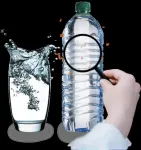(Press-News.org) A common antihistamine may offer hope for patients with a rare genetic disease that can lead to severe liver damage and ultimately require transplantation, according to new research from Rutgers Health.
The study in Cellular and Molecular Gastroenterology and Hepatology found that chlorcyclizine, a decades-old allergy medication, could potentially treat erythropoietic protoporphyria (EPP), a condition that creates extreme skin light sensitivity and can produce toxic levels of protoporphyrin in the liver, bone marrow, red cells, and plasma.
"There is an unmet need for these patients," said Bishr Omary, senior vice chancellor for academic affairs and research at Rutgers Health and senior author of the study. "The primary treatment for patients with severe liver damage is liver transplantation, which is a major and life-saving surgery that depends on available donor organs."
EPP is a rare condition, affecting an estimated 4,000 people in the U.S. Of those, only a small percentage suffer enough liver damage to require transplantation. It is unlikely, therefore, that any company will develop a drug to treat the condition, which is why Omary and his colleagues tested existing medications.
The research team screened more than 2,500 compounds, including many FDA-approved drugs, in a zebrafish larvae EPP experimental system previously described by Omary’s lab. The tiny fish allow researchers to visualize the buildup of toxic compounds easily and test potential treatments.
"The zebrafish are transparent at their larval stage, and that allows us to quantify and visualize the porphyrin, which is fluorescent," said Ning Kuo, the first author of the study who worked with Omary at the University of Michigan, then Rutgers before moving to the University of California, San Diego to pursue her PhD. "It was easy to evaluate each treatment under the microscope. If I saw glowing porphyrin, the treatment didn’t work. If I didn’t, the treatment had enabled the liver to excrete it into the fish culture medium.”
When the researchers tested chlorcyclizine in mice with EPP, they found that female mice, but not male mice, experienced reduced hepatic protoporphyrin accumulation and liver injury, decreased protoporphyrin in bone marrow and red cells and increased protoporphyrin excretion in stool. This sex-specific effect appears related to how quickly males metabolize the drug.
"In rats, chlorcyclizine is metabolized eight times higher in male versus female livers," said Omary. "Fortunately, we're not aware of similar chlorcyclizine metabolism differences in humans."
The study team, which included one researcher from Michigan, replicated their findings using an independent toxin-induced EPP mouse model. They also showed in EPP liver cell culture models that the histamine pathway promotes porphyrin accumulation, which is blocked by the over-the-counter antihistamine drug classes that treat allergy (e.g., chlorcyclizine or fexofenadine) or that limit acid production (e.g., cimetidine or ranitidine).
Detailed analysis showed that chlorcyclizine appears to work through multiple mechanisms, including helping the liver clear toxic porphyrin buildup and reducing inflammation. It also decreased the presence of mast cells, a type of immune cell that produces histamine.
For EPP patients, the findings could eventually lead to a much simpler treatment option than transplantation by preventing liver damage at a much earlier stage. The antihistamine allergy drugs have been used safely for decades, which could help speed the path to clinical trials for this new use.
The researchers hope to secure support for a clinical trial to test the effectiveness of chlorcyclizine in EPP patients for both liver and skin involvement. A phase 2 clinical trial is already underway, testing the antacid cimetidine for treating the skin manifestations of EPP. It is possible that the different antihistamines may act additively or synergistically.
"Given their well-established safety, we hope to fast-track trials of chlorcyclizine either alone or in combination with cimetidine," Kuo said.
END
A common antihistamine shows promise in treating liver complications of a rare disease complication
2025-01-15
ELSE PRESS RELEASES FROM THIS DATE:
Trastuzumab emtansine improves long-term survival in HER2 breast cancer
2025-01-15
In patients with high-risk HER2-positive breast cancer, post-surgery, or adjuvant, treatment with trastuzumab emtansine (T-DM1) reduced the long-term risk of death or invasive disease by 46% and improved survival compared to trastuzumab alone, according to the final results of the phase 3 KATHERINE clinical trial led by researchers from the University of Pittsburgh and UPMC Hillman Cancer Center.
The findings, published today in the New England Journal of Medicine (NEJM), provide long-term evidence that T-DM1 is an effective adjuvant treatment for this population of breast ...
Is eating more red meat bad for your brain?
2025-01-15
MINNEAPOLIS — People who eat more red meat, especially processed red meat like bacon, sausage and bologna, are more likely to have a higher risk of cognitive decline and dementia when compared to those who eat very little red meat, according to a study published in the January 15, 2025, online issue of Neurology®, the medical journal of the American Academy of Neurology.
“Red meat is high in saturated fat and has been shown in previous studies to increase the risk of type 2 diabetes and heart disease, which are both linked to reduced brain health,” said ...
How does Tourette syndrome differ by sex?
2025-01-15
MINNEAPOLIS — Tourette syndrome is currently diagnosed about three times more frequently in males than in females. A new study finds that female individuals are less likely to be diagnosed with the syndrome, take longer to receive a diagnosis and are older when they are diagnosed than male individuals. The study is published in the January 15, 2025, online issue of Neurology®, the medical journal of the American Academy of Neurology.
Tourette syndrome is a neurodevelopmental disorder defined by ...
Red meat consumption increases risk of dementia and cognitive decline
2025-01-15
Red meat consumption is an established risk factor for chronic conditions, including cardiovascular disease and type 2 diabetes. A new study by investigators from Mass General Brigham, Harvard T.H. Chan School of Public Health, and the Broad Institute of MIT and Harvard found that eating greater quantities of red meat, especially in processed forms, increased risk for dementia, too. Results, published online on January 15, 2025, in Neurology®, the medical journal of the American Academy of Neurology, highlight that replacing processed red meat with protein sources like nuts and legumes or fish may decrease dementia risk by approximately 20 percent.
“Dietary ...
Study reveals how sex and racial disparities in weight loss surgery have changed over 20 years
2025-01-15
Racial disparities decreased slightly, but sex disparities increased significantly over 20-year period
Fewer Black people and men underwent weight loss surgery than other racial groups and women, respectively
A new study by Mass General Brigham investigators shows persistent racial disparities and growing sex disparities between patients who discussed and received weight loss surgery between 2000 and 2020. Using artificial intelligence to analyze the medical records of more than 120,000 patients with obesity, researchers found that Black people ...
Ultrasound-directed microbubbles could boost immune response against tumours, new Concordia research suggests
2025-01-15
A new paper by a team of Concordia researchers from the departments of Biology and Physics proposes a novel method of fighting cancer tumours that uses ultrasound-guided microbubbles — a technology already widely used in medical imaging and drug delivery.
Writing in the journal Frontiers in Immunology, the researchers describe a process that uses ultrasound to modify the behaviour of cancer-fighting T cells by increasing their cell permeability. They examined how this can influence the release of more than 90 kinds of cytokines, a type of signalling molecule crucial for immune response.
The researchers targeted freshly isolated human immune cells with tightly ...
In small preliminary study, fearful pet dogs exhibited significantly different microbiomes and metabolic molecules to non-fearful dogs, suggesting the gut-brain axis might be involved in fear behavior
2025-01-15
In small preliminary study, fearful pet dogs exhibited significantly different microbiomes and metabolic molecules to non-fearful dogs, suggesting the gut-brain axis might be involved in fear behaviors
Article URL: https://journals.plos.org/plosone/article?id=10.1371/journal.pone.0315374
Article title: Altered microbiome and metabolome profiling in fearful companion dogs: An exploratory study
Author countries: Italy
Funding: The author(s) received no specific funding for this work. END ...
Examination of Large Language Model "red-teaming" defines it as a non-malicious team-effort activity to seek LLMs' limits and identifies 35 different techniques used to test them
2025-01-15
Examination of Large Language Model "red-teaming" defines it as a non-malicious team-effort activity to seek LLMs' limits and identifies 35 different techniques used to test them
Article URL: https://journals.plos.org/plosone/article?id=10.1371/journal.pone.0314658
Article title: Summon a demon and bind it: A grounded theory of LLM red teaming
Author countries: US, Denmark
Funding: VILLUM Foundation, grant No. 37176: ATTiKA: Adaptive Tools for Technical Knowledge Acquisition. The funders had no role in study design, data collection ...
Most microplastics in French bottled and tap water are smaller than 20 µm - fine enough to pass into blood and organs, but below the EU-recommended detection limit
2025-01-15
Most microplastics in French bottled and tap water are smaller than 20 µm - fine enough to pass into blood and organs, but below the EU-recommended detection limit for water quality assessments.
####
Article URL: https://journals.plos.org/water/article?id=10.1371/journal.pwat.0000250
Article Title: Majority of potable water microplastics are smaller than the 20 μm EU methodology limit for consumable water quality
Author Countries: Denmark, France
Funding: This work and the PhD fellowship of O.H. is funded by an 80Prime CNRS grant «4DμPlast» (G.L.R, J.E.S.). This publication was supported by ANR-20-CE34-0014 ATMO-PLASTIC (G.L.R, J.E.S.) and the Plasticopyr ...
A tangled web: Fossil fuel energy, plastics, and agrichemicals discourse on X/Twitter
2025-01-15
An analysis of the nine top players in the U.S. fossil fuel-derived hydrocarbon industries (oil/gas, plastics, and agrichemicals) shows tight linkages across the three different sectors, with news media, other petrochemical industry players, and politicians also frequently tagged, according to a study published January 15, 2025 in the open-access journal PLOS Climate by Alaina Kinol from Northeastern University, United States, and colleagues.
Previous research on connections between the fossil fuel and plastics sectors and ...



